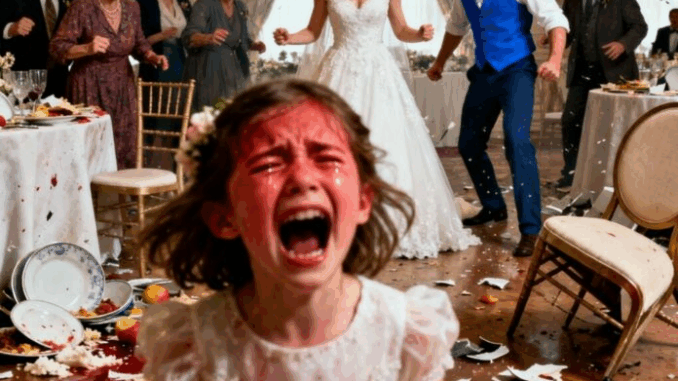

“She was only thirteen — but she saw what no one else could see.”
The white roses, the music, the laughter — everything about the wedding looked perfect. Guests whispered about how radiant Grace Taylor looked in her elegant dress. Her fiancé, Richard Allen, stood proudly at the altar, his charming smile lighting up the chapel.
But in the front row, Grace’s 13-year-old daughter, Sophie, sat stiffly, her small hands gripping the edge of her chair. Her heart pounded with fear, not joy.
Everyone thought Sophie was just jealous of her mother’s new husband. But Sophie knew something no one else did. She had seen Richard’s eyes when he thought no one was watching — the coldness behind the charm. She’d seen him delete messages, hide phone calls, and once, push her mother’s dog so hard it yelped.
Three days before the wedding, Sophie had told Grace:
“Mom, please don’t marry him. He’s not who you think he is.”
Grace smiled kindly. “You’re just scared of change, sweetheart. Richard loves us both.”
But Richard didn’t love them both. He loved control.
The night before the wedding, Sophie’s best friend Liam, a computer-savvy boy from school, helped her look into Richard’s background. They discovered something terrifying: Richard Allen had used two different identities in two other states — and both times, the women he dated vanished soon after.
Sophie printed everything, desperate to show her mother, but Grace refused to look. “I’m done letting your imagination ruin my happiness,” she said and stormed off.
Now, the ceremony had begun. The priest asked, “If anyone has a reason why these two should not be joined, speak now or forever hold your peace.”
Sophie stood up.
The room went silent.
“Mom… you can’t marry him!” she shouted, tears in her eyes. “He’s lying about who he is!”
Grace froze. Richard’s charming smile faded.
Liam, standing by the door, connected his phone to the church speaker. A man’s voice echoed through the chapel — Richard’s voice, recorded the night before.
“You really think I’ll let another woman walk away from me, Grace? You’ll do exactly what I say — or you’ll end up like the others.”
The guests gasped. Grace’s bouquet fell from her trembling hands.
And for the first time, Richard’s mask cracked completely.
The chapel descended into chaos. Guests screamed. The priest stumbled back. Grace stepped away from Richard as police officers, already alerted by Liam, stormed in.
“Richard Allen,” one of them shouted, “you’re under arrest for fraud and suspicion of assault.”
Richard didn’t resist — at first. Then, with a sudden twist, he shoved an officer and ran toward the side exit. People scattered. Sophie screamed as Richard lunged toward her, but another officer tackled him to the ground.
Within minutes, he was handcuffed.
Grace fell to her knees, sobbing, clutching Sophie tightly. “My God, what have I done?”
At the police station later that evening, Detective Monica Harris showed Grace and Sophie the full report. Richard’s real name was David Rowe, wanted in connection with the disappearance of two women — Claire Benson and Olivia Price — both former fiancées. Evidence included fake IDs, hidden passports, and messages threatening the victims.
Grace felt sick. “He was in my home,” she whispered. “Around my daughter…”
Sophie reached for her hand. “You didn’t know, Mom.”
But Grace couldn’t stop shaking. She replayed every dinner, every compliment, every touch — realizing how close she had been to destruction.
The next morning, as the news spread, reporters gathered outside the police station. One headline read:
“Bride’s Daughter Saves Mother from Marrying Serial Fraud.”
Detective Harris commended Sophie for her courage: “If this girl hadn’t spoken up, we might never have caught him.”
Still, the trauma lingered. Grace avoided mirrors, haunted by her own blindness. Sophie, on the other hand, felt both relief and guilt — relief that her mother was safe, guilt that it took public humiliation to prove the truth.
A week later, Grace received a letter from the FBI confirming DNA evidence tying Richard—David—to one of the missing women. He faced charges for identity theft, kidnapping, and attempted murder.
Grace read the letter aloud, her voice breaking. “He could’ve killed me.”
Sophie squeezed her mother’s hand. “But he didn’t. Because you listened — finally.”
Months passed. The wedding that almost was had become yesterday’s news. The scars remained, but the danger was gone.
Grace sold the old house — every corner of it reminded her of Richard’s lies — and moved with Sophie to a smaller town. They started fresh. Grace opened a small bakery, something she had dreamed of for years but never dared to do.
Every morning, Sophie helped frost cupcakes and manage orders. Their laughter slowly replaced the silence that once filled their days.
One afternoon, Detective Harris stopped by the bakery with an update. “He took a plea deal,” she said. “Thirty years, no parole.”
Grace exhaled, the weight finally lifting from her chest. “It’s over,” she said softly.
Sophie smiled. “No, Mom — it’s beginning.”
For the first time, Grace looked at her daughter not as a child, but as the reason she was still alive. “You saved me,” she said, tears glimmering in her eyes.
Sophie shook her head. “You saved yourself. You just needed someone to make you look.”
Later that evening, as the sun set outside the bakery, Grace lit the string of lights above the counter. The warm glow reflected in the window, where their reflections stood side by side — mother and daughter, survivors of deception, builders of a new life.
Grace whispered, “From now on, no more secrets.”
Sophie grinned. “Promise?”
“Promise.”
And outside, the last rays of sunlight touched the sign above the door:
“Sophie’s Grace Bakery – Made With Truth.”
It wasn’t just a name — it was a reminder of what they had fought for.
Because sometimes, it only takes one brave voice to stop a wedding… and save a life.
Để lại một phản hồi